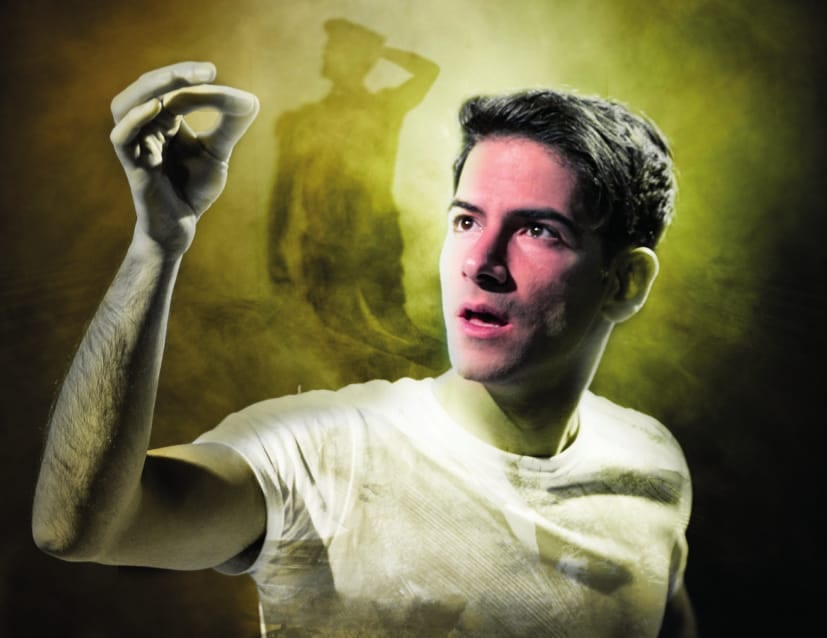Sometimes theatre overwhelms you with the collective power of all the dramatic arts gathered and then released by the full spectacular resources of a huge company. But sometimes too, a single performer can draw and conjure you into their world and take you on just as exacting and exhilarating an emotional journey. Such is the remarkable achievement of Niv Petel, a new and rare talent, in just one hour, and using the most minimal external means.
In the simple black box theatre at Tristan Bates there is just a white table and chair, a portable phone, a cutting board which later morphs into a keyboard, and a couple of pairs of spectacles. With this slight repertoire of props, Petel, dressed simply in a white t-shirt and fatigues, tells the story of an Israeli single mother, Ilana, and her son Elad, spanning twenty years. Ilana is an army officer responsible for breaking the news to families of deaths in combat. We see her multi-tasking with work and child care, chatting with a neighbour, and interacting with her son – whether holidaying on a beach, preparing and sharing meals, doing battle through the teenage years, and then eventually, as he leaves home, reacting to the growing realisation that he wishes to volunteer for a combat unit in military service.
But the plot, simple and plausible as it is, is only a bare framework on which Petel hangs a sequence of very funny and increasingly poignant vignettes of increasing power and credibility. While we only ever hear one side of the exchanges, the skill of the writing and acting is such that we feel that we have heard from the son too, with our own imaginations filling in gaps in the texture. We experience all the swings and twists and shifts of power within this relationship, and begin to internalise Ilana’s dilemmas for our own. But we also feel we know Elad and his psychology well even though he is never seen and never directly speaks.
This is a play with – literally – a very strong Israeli accent, but it miraculously avoids all the obvious pitfalls. The writing plays with and finesses the stereotype of the over-protective, bossy, Jewish mother, while leaving Ilana’s personality still individual, intact and appealing. It also manages to pick its way through to the kernel of the ‘pity of war’, without any direct commentary on Middle Eastern politics. In an apolitical but still intensely human way Petel shows us that ‘sacrifice is a coin with two sides’; so that this mono-drama aligns itself with the clear-eyed, austere, yet all-embracing treatment of the sacrifices in war that we find in the best Greek tragedies.
Over and above the effectiveness, warmth, accessibility and realism of the text the performance demonstrates remarkably well thought-through routines of mime that provide important moments of sound-track for the play, once more giving us a sense that there is more than one person onstage, and offering plausible transitions between the scenes. We are not merely talking the gentle art of mime here, but truly taxing routines of mechanical imitation and cumulating human emotion that must be very taxing for the performer to bring off. It is almost that Petel provides us with 3-D glasses through which to see the reality of the scenes he is depicting in close-up and surround-sound. One sequence that bookends the drama involves him apparently in the innocent domestic task of threading a needle and beginning to sew – except he breaks off to stab the needle into his flesh and impress the stiches in his own skin. While we are ‘just’ watching a mime, this episode is in performance so surprising and compelling it is incredibly painful to watch, and acts as a crisp and concise distillation of the tragic story to follow.
January is often a time for huddling at home with comfort television, but you will not regret making the effort to emerge to encounter this fine, confronting, story, so memorably told. As a piece of precisely considered technical acting Petel’s performance is hard to beat, but what makes this short play unmissable is the great heart at its centre, and a sense of unillusioned truth about relationships, their fragility and resilience, in the glare of a cruel world. You will not spend a more rewarding hour….

